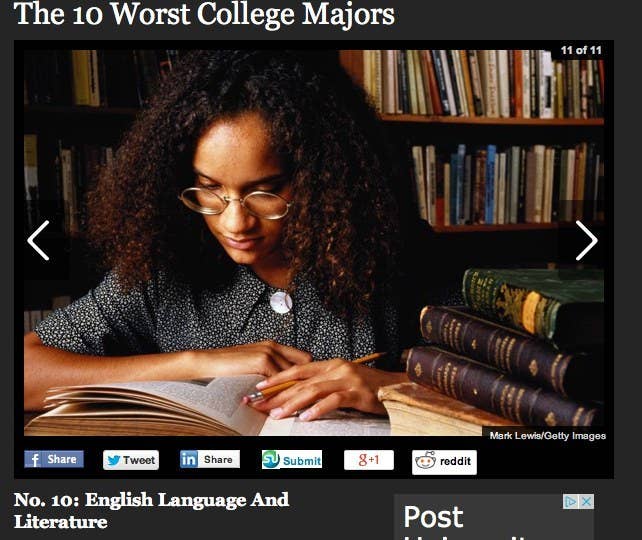How often do you see this?

May be applicable to a handful of other liberal arts degrees if stretched*
Admit it. We have all heard it at some point or another within our years of painfully slaving away over a stack of books and a word processor: "What's the point? Why study a subject that promotes useless knowledge? Why read books hundreds of years old?" However, what these people fail to realize is that you are learning so much more than how to cite Dickens in proper MLA format or recognize iambic pentameter (which, as a teacher, I am convinced no one really learns anyways). I think it is time to rebrand the English degree from the public misconception of simply reading and writing. While yes, the vast majority of our time is spent doing just that, an English degree, in essence, is a critical thinking degree. The English degree is a degree in humanity, providing artistic insight to cultures long gone and artists who have been dead for centuries. I know, by now you must be thinking, "Great job, dipshit. You are reinforcing everyone's point of English being a useless field that does nothing but encourage pretentious kids into starting a blog/assuming they can write." For those of you thinking this, please bear with me.
What is a skill valued in virtually the entire workforce, regardless of field? Argue if you will, but the answer is communication. At some point, whether daily, or in the most minute of ways, strong communication is necessary whether oral, written, or what have you. English majors thrive on communication. Not only have English majors spent four (read: 5) years reading voices that vary from "Shall I compare thee to a summer's day?" to the most modern day authors that are currently publishing works, but learning how to critically evaluate said works in one's own voice as well. As a result, the English field has produced an army of young adults ready to think, write, and communicate regardless of the situation they find themselves in and who they need to address. When, in order to graduate, one must literally read a hundred or so works of literature, each potentially written in a different voice, you pick up a thing or two from the authors, the protagonists, the antagonists, and even the most minor characters who may have nothing to do with the overarching plot and simply pop in to say hello in chapter 47. This leads to a diverse toolbox of skills applicable to every day life because an English major has essentially studied the life and/or trials of hundreds of literary characters. Problem solving? No problem for you, for the entirety of your college career you have been provided a window into the minds of some of the greatest thinkers of all time, whether author or fictional character. Instead of studying one brief civilization, one fleeting moment in time, one small aspect of culture, the English major has, at some point or another, studied them all through the characters they have brought to life inside of their heads thus creating a well-rounded thinker. As a result, no problem seems new, no obstacle seems insurmountable, because you bet your ass at some point in your academic career, you have read about something similar. While directly applying literary and fictional works to real life labor is not always the best route, (see Melville's Bartleby and then chuckle because you didn't need Google to get the reference) at the very least, you have more than likely learned what not to do, seen how others handled similar situations, or learned to speak and/or write in a variety of voices relevant to your own work environment.
We made it to number 3!!!!1!!~

When you have a major that is almost unanimously deemed as useless, the key to refuting these claims is knowing how to market your self and your vast skillset provided by said "useless" major. You are more than just an English major; never let your major define who you are. You are a writer, a thinker, a cultural studies expert, a historian, a speaker, a combination of the hundreds of minds that you have visited and seen the world through, and most importantly, you are what no one else can hope to compete with . . . you are uniquely you. Have the confidence to market yourself as such.

